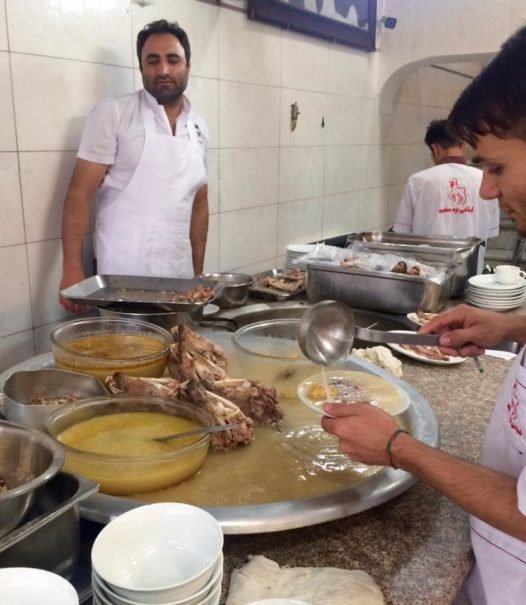
The Best Part of Waking Up Is a Boiling Sheep Carcass

The Best Part of Waking Up Is a Boiling Sheep Carcass
Kaleh pacheh in Tehran
The smell wakes you up first; an acrid alarm call of boiling sheep carcass, catching the back of the throat with more kick than a triple espresso. Iran’s heartiest breakfast, kaleh pacheh—sheep’s heads and hooves—is being served at Tehran’s Bare Sefid, a stripped-back joint of wipe-down tables and tiled walls. Its logo is a prancing lamb.
We are straight off the plane from London and at 7 a.m., this is some education in Persian cuisine. Our guide had gleefully suggested a traditional Iranian breakfast. We imagined bread, cheese, carrot jam, and fresh tea. There is too much shame in backing out now.
At least we can choose the bits we want: cheek, tongue, eyeballs, brain. Everything is doused in ladles of broth and an optional slosh of fat, skimmed from the pot. No wonder Iran’s doctors warn of kaleh pacheh’s cholesterol content. Bare Sefid is pretty low key; one man removes the meat from the carcasses, simmered overnight or for five hours at the very least. Another is on broth duty, hypnotically drenching the cooked heads and each dish before it goes to the customer.
The meat arrives on plates to pick over. Tongue is firm and close-textured; the cheek delicate, shredding under a spoon like an hours-long stew should. Bowls of golden broth come with brain—gelatinous, creamy blobs—floating in the clear stock. Other customers drift in and some order a whole brain, the size of a child’s fist, wobbling on the plate, its surface shiny and with that familiar maze-like, walnut appearance.
I mash the brainy blobs into my broth. Brain is unmistakable in the mouth: mushy, offaly, nutrient-rich. Too much. I tear up the accompanying lavash flatbread and pile it into the broth with a squeeze of fresh lemon juice. Yes, that works; wholesome and rejuvenating.
In her terrific book, Persia in Peckham, Sally Butcher cites heads and hooves as a hangover cure (yes, even in Iran), and as a “great treat for the family.” However, it is unlikely I’ll follow her recipe for recreating this dish at home.
Yet this is the best start to our Persian adventure. Eating kaleh pacheh becomes a badge of honor as we travel through Iran, sharing our impressions of the country with curious locals. My other half is playing a tennis tournament while we’re here, and news of his pre-match preparation sweeps through the opposition like Roger Federer’s backhand. Who is this bold British cat? Then he wins the tournament.
While buttery, saffrony rice unites the nation, it becomes clear that kaleh pacheh divides; Iranian men swear by it, beating their chests in appreciation. Women are less convinced. A mother tells me she served it to her teenage daughters for its super-food quantities of collagen. They didn’t ask for seconds. And neither will I. Pass the pomegranate juice.